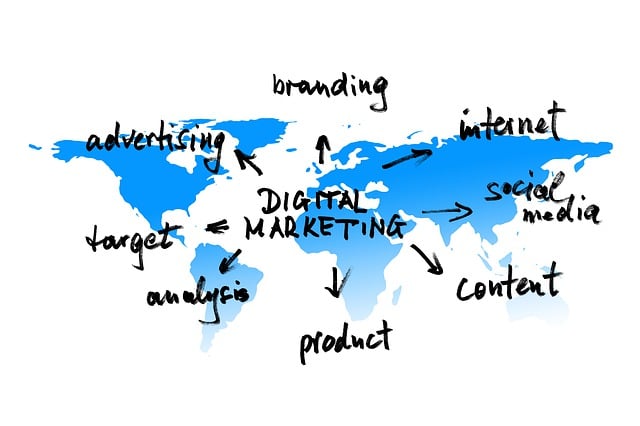Digital Marketing success hinges on understanding target audiences, leveraging data analytics for personalized campaigns, defining clear business objectives, crafting unique value propositions, optimizing channel selection, creating compelling content, implementing adaptive personalization with AI, strategically measuring KPIs, and adopting a dynamic optimization approach to stay relevant in the ever-evolving digital landscape.
In today’s digital era, effective digital marketing transcends generic approaches. Customized strategies that cater to specific target audiences and business goals are the game-changers. This article delves into the essential components of crafting personalized marketing campaigns. From understanding your audience and defining objectives to leveraging data analytics, creating unique value propositions, optimizing channels, and measuring success, each step is crucial in navigating the competitive landscape of digital marketing. Discover how these tailored techniques foster stronger connections and drive tangible results.
Understanding Your Target Audience: Unlocking Personalized Connections

Understanding your target audience is a cornerstone in crafting effective digital marketing strategies. It involves delving into their demographics, interests, behaviors, and pain points to create personalized content that resonates with them. By leveraging data analytics tools, businesses can uncover valuable insights about their customers, enabling them to segment their audience and tailor messaging accordingly. This level of customization fosters stronger connections between brands and consumers, enhancing engagement and driving conversions.
In the realm of digital marketing, personalizing interactions is a game-changer. It ensures that each customer feels seen and heard, leading to increased brand loyalty and advocacy. Through targeted campaigns, personalized emails, and dynamic website content, businesses can deliver relevant experiences that cater to individual preferences. This strategic approach not only boosts click-through rates but also encourages customers to become active participants in the marketing journey, contributing to sustained growth and success.
Defining Business Objectives: Setting the Course for Custom Strategies

Defining clear business objectives is the compass that guides the creation of custom digital marketing strategies. In today’s dynamic digital landscape, understanding your target audience, their behaviors, and preferences is paramount. By setting specific, measurable goals—whether it’s increasing brand awareness, generating qualified leads, or boosting sales—you establish a focal point for your efforts.
These objectives should align with your overall business strategy, reflecting the unique needs and aspirations of your organization. Once defined, they act as a roadmap, enabling you to tailor digital marketing tactics that resonate with your audience. From content creation to social media campaigns and SEO optimization, every element of your strategy contributes to achieving these established goals, ensuring your digital marketing efforts are not just impactful but also measurable.
Leveraging Data Analytics: Insights for Tailored Campaigns

In today’s digital era, leveraging data analytics is a game-changer for any marketing strategy. By gathering and analyzing vast amounts of consumer data, businesses can gain valuable insights into customer behavior, preferences, and trends. This information empowers marketers to create highly tailored digital campaigns that resonate with specific target audiences. With data-driven decisions, companies can optimize their Digital Marketing efforts, ensuring every message is relevant and impactful.
For instance, analytics tools enable marketers to identify demographic and psychographic segments within their customer base. This segmentation allows for personalized content creation, where ads, emails, and social media posts are crafted to appeal directly to each segment’s unique characteristics. Such tailored approaches significantly increase engagement rates and conversion probabilities, ultimately driving business growth and success in a competitive digital landscape.
Crafting Unique Value Propositions: Differentiating Your Brand

In the dynamic realm of digital marketing, crafting a unique value proposition is your brand’s golden ticket to standing out in a crowded marketplace. It’s about identifying what sets your product or service apart from competitors and communicating it compellingly to your target audience. This differentiation strategy involves delving into your brand’s essence, understanding customer pain points, and presenting your offerings as the perfect solution. A strong value proposition should be clear, concise, and resonate with your audience on an emotional level, fostering trust and loyalty.
Digital marketing experts leverage various tools and platforms to convey these unique selling points effectively. From targeted online ads that speak directly to consumer needs to engaging content marketing campaigns that showcase your brand’s expertise, each element contributes to building a powerful image. By consistently delivering on your value proposition, you create a lasting impression, ensuring your brand is not just noticed but remembered in the vast digital landscape.
Channel Selection and Optimization: Where Your Audience Thrives

In digital marketing, channel selection and optimization are pivotal strategies that focus on identifying and leveraging the platforms where your target audience is most active and engaged. This involves a deep understanding of consumer behavior across various online environments, from social media to search engines and content-sharing sites. By pinpointing these thriving spaces, businesses can direct their resources effectively, ensuring their marketing efforts resonate with the right audiences.
Optimizing channels means refining your approach to maximize engagement and return on investment. This includes A/B testing different strategies, analyzing user interactions, and continually adapting to platform updates and algorithm changes. The goal is to create a seamless and compelling experience that aligns with audience preferences, ultimately driving conversions and fostering long-term brand loyalty in the competitive digital landscape.
Content Creation for Impact: Engaging Stories, Visuals, and Messaging

In the realm of digital marketing, content creation isn’t merely about filling space; it’s an art that drives engagement and leaves a lasting impression. Effective strategies involve crafting compelling stories that resonate with audiences on a personal level. These narratives should be integrated seamlessly into various media formats, from captivating visuals to thought-provoking copy, ensuring every element contributes to the overall message.
Visuals play a pivotal role in capturing attention, fostering emotional connections, and enhancing brand recall. High-quality images, infographics, and videos can illustrate complex ideas, making them more digestible for viewers. When combined with well-timed messaging, these visual elements can significantly impact consumer behavior, driving conversions and fostering a stronger brand identity within the competitive landscape of digital marketing.
Personalization Techniques: Adaptive Experiences for Every Customer

In the realm of digital marketing, personalization is no longer an option but a necessity. Adaptive experiences cater to each customer’s unique preferences and behaviors, enhancing their interaction with brands. By leveraging advanced technologies like AI and machine learning, businesses can create dynamic content that adjusts in real-time based on user data. This ensures that every customer receives a tailored experience, increasing engagement and conversion rates significantly.
Personalization techniques go beyond simple product recommendations. They involve creating personalized emails, web pages, and even ads that resonate with individual customers. For instance, using customer journey mapping helps brands understand their audience’s pain points and aspirations at each stage. This knowledge enables the delivery of relevant content and offers, fostering stronger relationships and driving sales in a highly competitive market.
Measuring Success: Key Performance Indicators for Custom Strategies

Measuring success is a vital component of any digital marketing strategy, especially when it comes to custom, tailored plans. Unlike one-size-fits-all approaches, custom strategies require a nuanced approach to evaluation. Key Performance Indicators (KPIs) should be carefully selected to align with specific campaign goals and the unique nature of each client’s business. For instance, for an e-commerce brand focusing on increasing sales through targeted ads, KPIs might include conversion rates, click-through rates, and return on ad spend. These metrics provide a clear picture of how effectively the custom digital marketing strategy is driving desired actions and conversions.
In the realm of Digital Marketing, success isn’t solely defined by broad metrics like website traffic. For custom strategies, it’s about translating campaign efforts into tangible business outcomes. By tracking relevant KPIs, marketers can make data-driven adjustments, optimize campaigns, and ultimately enhance the return on investment (ROI). This iterative process ensures that each strategy remains agile, responsive to market changes, and consistently delivers measurable results tailored to the client’s specific needs.
Iteration and Refinement: Continuously Optimizing Your Approach

In the dynamic realm of digital marketing, success isn’t a static state but an ongoing journey of iteration and refinement. It’s not enough to craft a strategy once and expect it to remain effective indefinitely. The digital landscape evolves at a rapid pace, with new trends, algorithms, and consumer behaviors constantly emerging. Therefore, marketers must embrace a mindset of continuous optimization, where each campaign is a chance to learn and improve.
Regularly analyzing campaign performance data allows for informed decisions on what works best and what needs tweaking. By testing different tactics, copy, or target audiences, businesses can identify the most successful elements and double down on them. This iterative process ensures that digital marketing strategies remain relevant, engaging, and aligned with the ever-changing digital marketplace.
